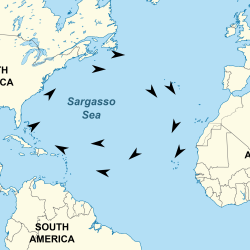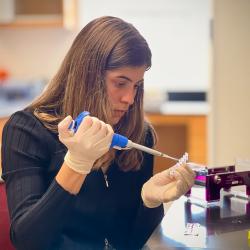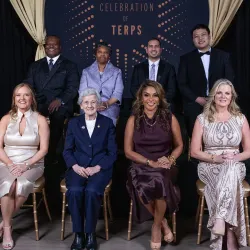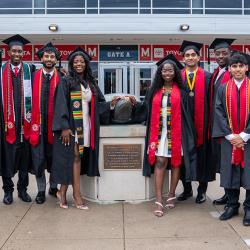Meet UMD Senior Biological Sciences Major Avan Antia
This is the third profile in our new series, where we'll introduce you to Terp student scientists from the University of Maryland's College of Computer, Mathematical, and Natural Sciences.
Meet Avan Antia, a senior biological sciences major and Spanish minor who is spending her summer learning Hindi in Jaipur, India, as a Critical Language Scholarship (CLS) recipient. The CLS program is a program of the U.S. Department of State. During this two-month-long immersive language program, she attends classes, converses with a language partner and participates in various cultural events. She also practices her Hindi with the host family she’s living with. Antia, who is from Rockville, Md., attended Thomas S. Wootton High School.
Why did you decide to attend the University of Maryland?
When I got accepted to the University of Maryland, I was invited to join the Integrated Life Sciences (ILS) program in the Honors College. I attended an ILS information panel and met students in the program as well as the fabulous staff, including Dr. Todd Cooke, Dr. Boots Quimby and Nicole Horvath. A certain warmth and passion for science emanated from them all. I remember feeling eager as the “ILSers” spoke to me enthusiastically about the biology courses they were taking as part of the program. Three years later, I know that I made the right decision to attend UMD and I wouldn’t change it for the world.
What attracted you to your major?
I had incredible teachers in high school, so I owe it to them for introducing me to the beauty of science. I was initially attracted to biology because I've always been fascinated by the diversity of living organisms. As I took more courses in the field, I became aware of the numerous career paths biology offered. Majoring in biology didn’t limit my options because the field is so interdisciplinary. Through this major, I have been able to take courses that blend physics, math, chemistry, and even astronomy, with biology.
As a biological sciences major, what interested you in foreign languages?
I am interested in pursuing a career in infectious disease and possibly tropical medicine. Of course, the best place to learn about tropical diseases is in the tropics. Along with my minor in Spanish, proficiency in Hindi will open many doors for me. Because I intend to work abroad in the future, acquiring language skills is essential. In addition, my family is from India, so it is very exciting to connect with my cultural roots. During the program, I have met many other students also interested in various aspects of medicine and health who agree that foreign language skills are an advantageous complement to the sciences.
What organizations are you involved with at UMD?
I have been involved with SHARE (Supporting Hospitals Abroad with Resources and Equipment) since my freshman year. Through the years, I’ve had the pleasure of seeing the organization grow, both in size and impact. Our overall mission is to promote medical sustainability by sending surplus medical supplies (which would otherwise be disposed) from local hospitals to under-supplied medical centers abroad. So far, we have sent supplies to Panama, Jamaica, Kenya and Vietnam. This organization is especially unique because of its strong student leadership. This summer, we are thrilled that a few students are visiting Don Amolo Children’s Ark in Kenya, one of the clinics that we formed a close relationship with over the past year.
I also serve as a peer mentor in the First-Year Innovation and Research Experience (FIRE) program. This program is unique because it gives freshmen the opportunity to participate in authentic research with publication potential. I help teach the students in the program how to conduct research through projects in the laboratory of Cell Biology and Molecules Genetics Department Chair Jonathan Dinman, where I’ve worked for the past year.
Best memory as a Terp?
One night during freshman year in the lounge of my dorm, a group of ILS students began solving riddles. Soon, the lounge became packed with students putting their minds to the test, solving riddle after riddle. This impromptu night of brainteasers launched many great friendships among ILS students and served as a testament to our mutual passion for problem solving and collaboration.
Favorite class?
This is a difficult question because each class is so unique that it is hard to compare. If I had to choose the class that changed my academic course, I would select Introduction to Microbiology. This class catalyzed my interest in microbiology and infectious disease and gave me a more specific academic aim. The lab introduced me to techniques that are applicable to the work that I am currently doing in my research lab. The class itself was fascinating and we shared many laughs with classmates and our excellent professor, Dr. Richard Stewart.
Favorite professor?
I have had quite a few professors who have inspired, motivated and impacted me in various ways, including ILS program directors Dr. Todd Cooke and Dr. Boots Quimby. Not only have they offered me invaluable advice since my freshman year, but they have also provided me with unyielding support in all aspects of my life, including my desire to study Hindi through the CLS program. In addition, I served as an undergraduate teaching assistant for Dr. Cooke—in what I would call one of the transformative experiences that fostered my interest in teaching. I’m sure other ILS students would agree that these professors have dedicated countless hours to improving the ILS courses and experience. I am honored to have these professors as mentors, cheerleaders and friends.
What advice would you give prospective students in your major?
This may seem counterintuitive, but as a student of any science, it is incredibly important to explore fields outside of your major or your academic interests. This is the best way to take advantage of the tremendous number of educational opportunities that you have at your fingertips. In fact, learning about something new can often help you understand your own academic specialty in a broader sense. Understanding how different subjects fit in with each other in the great patchwork of knowledge is a humbling realization.
What do you do in your free time?
Whenever I have free time, I like to explore UMD and the surrounding community. Whether I’m seeing a play at The Clarice, participating in cultural events at Nyumburu or attending guest lectures around campus, I enjoy trying new things and discovering little treasures in and around campus. I like to stay productive, so even studying in a building that I haven’t before visited is a new and welcome experience.
What do you want to do when you finish your degree?
Career-wise, I aim to practice medicine or conduct research on tropical diseases abroad. I dream of providing medical services to those living in rural areas, where such services are highly sought after. My post-graduation plans remain flexible, as I’m always hearing about new opportunities. For example, I recently became very interested in global health and education, and I would love to learn more about the field. As a result, I am ready for whatever and wherever life leads me.
Has your time at Maryland influenced or changed your future plans?
Absolutely! Maryland has provided me with fertile soils to seed new interests and cultivate existing interests. I came to college with the grand idea of being a “biologist” without really knowing what that meant. During my time at Maryland I became interested in medicine, microbiology, and recently, global health and education. Maryland has showed me that life is not a race, but rather a journey. I have been fortunate enough to have had many transformative experiences while at UMD, especially my current experience in India. Although I do not know whether I will be pursuing medical or graduate school, I am thankful for the confidence that Maryland has given me to be ready for anything.
Anything else you’d like to add?
One of the best bits of advice I ever received in college was, “Make yourself feel awkward.” In unfamiliar situations, when you are pushed far out of your comfort zone, you grow the most as a student and as a person. Taking this advice to heart helped me better understand myself in the greater context of the world and helped shape my career goals. Join a student organization you never thought you would join or go on an alternative break trip with a group of new people. Great pioneers become “great” because they tread upon virgin lands.
Writer: Josh Nesselrodt







